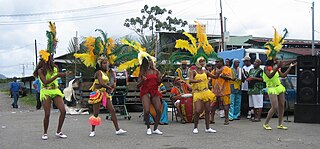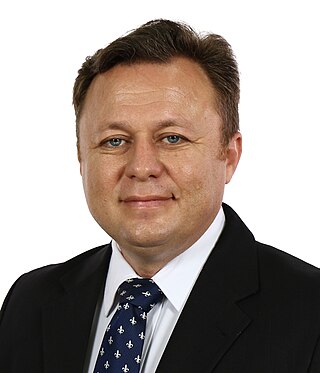
The politics of Costa Rica take place in a framework of a presidential, representative democratic republic, with a multi-party system. Executive power is exercised by the president and their cabinet, and the President of Costa Rica is both the head of state and head of government. Legislative power is vested in the Legislative Assembly. The president and 57 Legislative Assembly deputies are elected for four-year terms. The judiciary operates independently from the executive and the legislature, but is involved in the political process. Costa Rica has a strong system of constitutional checks and balances. Voting is compulsory de jure, but this is not enforced.

Miguel Ángel Rodríguez Echeverría is a Costa Rican economist, lawyer, businessman and politician who served as President of Costa Rica from 1998 to 2002. He was minister of planning from 1968 to 1970 and minister of the presidency in 1970 during the administration of Jose Joaquin Trejos Fernandez ; member of the board of the Costa Rican Central Bank from 1966 to 1969; congressman from 1990 to 1993, serving as president of the Legislative Assembly during the 1991 to 1992 period; and was elected Secretary General of the Organization of American States (OAS) in 2004. He voluntarily stepped down from this post to return to his country to face allegations of financial wrongdoing during his presidential tenure in Costa Rica. On April 27 of 2011 he was sentenced to 5 years in prison, but this ruling was later reversed in a December 2012 decision by an appeals court, which found him innocent of all charges.

The Citizens' Action Party is a political party in Costa Rica.

The Legislative Assembly forms the unicameral legislative branch of the Costa Rican government. The national congress building is located in the capital city, San José, specifically in Carmen district of the San José canton.

The Costa Rican Renewal Party is a Christian political party in Costa Rica.
Same-sex marriage has been legal in Costa Rica since May 26, 2020 as a result of a ruling by the Supreme Court of Justice. Costa Rica was the first country in Central America to recognize and perform same-sex marriages, the third in North America after Canada and the United States, and the 28th to do so worldwide.

Afro–Costa Ricans are Costa Ricans of African ancestry.

Epsy Alejandra Campbell Barr is a Costa Rican politician and economist who served as the Vice-president of Costa Rica from 8 May 2018 to 8 May 2022. She is the first woman of African descent to be vice president in Costa Rica and in Latin America.
José Francisco de Peralta y López del Corral was a Costa Rican priest and politician. He was born in Cartago, Costa Rica, the son of José María de Peralta y La Vega and Ana Benita de Nava López del Corral. Peralta attended the University of León and was ordained as a pastor in León, Nicaragua in 1812. He was named a parish priest for the village Olocuilta, El Salvador.

General elections were held in Costa Rica on Sunday, 2 February 2014 to elect a new president, two vice presidents, and 57 Legislative Assembly lawmakers. In accordance with Article 132 of the constitution, incumbent President Laura Chinchilla Miranda was ineligible to run for a second consecutive term.

Juan Carlos Mendoza García is a Costa Rican politician and the country's current Ambassador to the United Nations. He was a deputy with the Citizens' Action Party during the 2010 to 2014 and served as President of the Legislative Assembly from 2011 to 2012.
Víctor Manuel Morales Mora is a Costa Rican politician and lawyer. He has served as a government minister in three different administrations and served a deputy. He was the mayor of Aserrí between 2010 and 2014.

The Constitution of Costa Rica is the supreme law of Costa Rica. At the end of the 1948 Costa Rican Civil War, José Figueres Ferrer oversaw the Costa Rican Constitutional Assembly, which drafted the document. It was approved on 1949 November 7. Several older constitutions had been in effect starting from 1812, with the most recent former constitution ratified in 1871. The Costa Rican Constitution is remarkable in that in its Article 12 abolished the Costa Rican military, making it the second nation after Japan to do so by law. Another unusual clause is an amendment asserting the right to live in a healthy natural environment.

Gonzalo Justo Facio Segreda was a Costa Rican lawyer, politician, and diplomat.

The history of the Costa Rican legislature is long and starts from even before its formal independence from the Spanish Empire. Costa Rica is one of the world's oldest democracies, thus, its parliamentary history dates back several centuries.

Ana Patricia Mora Castellanos is a Costa Rican sociologist, university professor, and politician.
Events in the year 2020 in Costa Rica.

Dragos Dolanescu Valenciano, known as Dragoș Dolănescu, is a Costa Rican psychologist and politician. Dolanescu is an independent congressman in the third year of the 2018-2022 legislative period. He gained his seat at the Legislative Assembly running in the Alajuela province race for the Partido Republicano Social Cristiano party (PRSC), which at the time he was also president of the organization. He resigned to PRSC after clashing with senior members of the party, who accused him of fund mismanagement in the 2020 municipal elections in retaliation for his resignation.

General elections were held in Costa Rica on 6 February 2022, to elect the president, two vice-presidents, and all 57 deputies of the Legislative Assembly. As none of the presidential nominees obtained at least 40% of the votes, a runoff was held on 3 April 2022, between the top two candidates, José María Figueres and Rodrigo Chaves Robles.

A Just Costa Rica is a Costa Rican political party. It nominated engineer Rolando Araya Monge as a presidential candidate for the 2022 Costa Rican general election.














